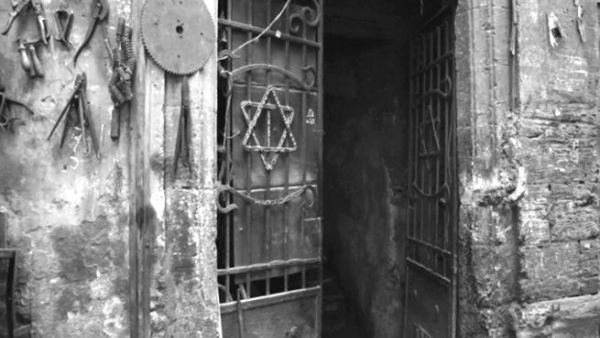Egyptian director Amir Ramses recently screened his latest documentary, Jews Of Egypt, at the Panorama of European Films in Cairo.
The documentary’s title implies a neutrality which does not really reflect the film’s clear stance, both on Israel as a colonizing entity, and on the need to defend the ethnic and religious diversity of the Arab world.
The film, produced by Haitham al-Khamissi, is a risky endeavor at a time when the debate over “Egypt’s identity” and the role of its minorities it heating up, especially following the electoral victory of the Muslim Brotherhood.The film, produced by Haitham al-Khamissi, is a risky endeavor at a time when the debate over “Egypt’s identity” and the role of its minorities it heating up, especially following the electoral victory of the Muslim Brotherhood.
A simplistic interpretation of the film would regard it as a eulogy for the diversity of Egypt before the 1952 revolution; a common, nostalgic theme that became prevalent in the last quarter of the 20th century when a number of novels and films were produced on the subject, the most famous being Birds of Amber by Ibrahim Abdul-Majid and the television series Zizinia by Osama Anwar Okasha.
The film opens with the well-known physician and politician Mohamed Abou el-Ghar, author of the acclaimed The Jews of Egypt: From Prosperity to Diaspora, describing Jewish life in Egypt up to 1956, when the Tripartite Attack forced many Jews to leave. As Ghar speaks, the camera shows commercial buildings that used to belong to Egyptian Jews.
Through a series of short interviews with ordinary Egyptians, the film reveals the complexity underlying the dominant image of Jews in Egypt, and particularly the conflation of Jews with Israelis in the minds of many. This confusion is seen by some as the result of a deliberate misinformation campaign encouraged by the Nasserite regime at the end of the 1950s. This perception was also encouraged by the Muslim Brotherhood in 1928, as well as the Young Egypt movement, a fascist party established in 1929.
The film then turns to a story which could have easily been the focus of the film, that of the leftist Albert Raeel, a prominent Egyptian Jew who refused to leave Egypt.
In the film, Raeel tells his story with humor and warmth, speaking of his years of struggle and how he was imprisoned together with many political leaders, most notably the former General Guide of the Muslim Brotherhood, Mohammed Mahdi Akef. Raeel was also in the audience during the screening.
The film goes on to explore the lives of some of those Egyptian Jews who did leave Egypt, such as the French journalist Alain Gresh, and how their lives changed once they had left. A romantic picture of Egypt emerges, one tinged with nostalgia.
The film depicts how class determined Egyptian Jews’ emigration options. While the upper and middle classes could afford to emigrate to Paris or San Francisco, the poor had to go to Israel. Those who relocated to Israel were forced by the Egyptian government to give up their nationality and any property rights in Egypt.
Through a series of short interviews with ordinary Egyptians, the film reveals the complexity underlying the dominant image of Jews in Egypt, and particularly the conflation of Jews with Israelis in the minds of many.Visually, the film is enhanced by the still photography of John Hakim and the editing of Ramses. However, the reduction of the documentary to a series of interviews robs it of character. This style, along with the film’s protracted length, negatively affects the rhythm and in many instances it feels more like a television program than a film.
Normalization With Israel?
Amir Ramses has not been spared criticism for his work, some of which is based on accusations of normalization with Israel.
“These accusations have no basis in reality,” Ramses said. “Anyone who claims that the film seeks to normalize relations with Israel could not have seen it or has interpreted it wrongly, because it is against Israel and against normalization.”
The director went on to say he refused to screen his film in Israel “because the film is about Egypt and Egyptians, and screening it in Israel takes away the importance of its cause.”
He added that the film has been well-received by critics, journalists, and audiences in Egypt, and that there are ongoing negotiations to show the film in a number of European countries, particularly in Spain.








